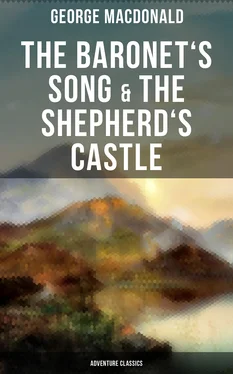"That's what they ca' ye, is't?" said Janet, looking motherly at him: "—Sir Gibbie Galbraith?"
Gibbie nodded vehemently.
"It'll be some nickname the bairns hae gien him," said Janet to herself, but continued to gaze at him, in questioning doubt of her own solution. She could not recall having ever heard of a Sir in the family; but ghosts of things forgotten kept rising formless and thin in the sky of her memory: had she never heard of a Sir Somebody Galbraith somewhere? And still she stared at the child, trying to grasp what she could not even see. By this time Gibbie was standing quite still, staring at her in return: he could not think what made her stare so at him.
"Wha ca'd ye that?" said Janet at length, pointing to the slate.
Gibbie took the slate, dropped upon his seat, and after considerable cogitation and effort, brought her the words, gibyse fapher. Janet for a moment was puzzled, but when she thought of correcting the p with a t, Gibbie entirely approved.
"What was yer father, cratur?" she asked.
Gibbie, after a longer pause, and more evident labour than hitherto, brought her the enigmatical word, asootr, which, the Sir running about in her head, quite defeated Janet. Perceiving his failure, he jumped upon a chair, and reaching after one of Robert's Sunday shoes on the crap o' the wa', the natural shelf running all round the cottage, formed by the top of the wall where the rafters rested, caught hold of it, tumbled with it upon his creepie, took it between his knees, and began a pantomime of the making or mending of the same with such verisimilitude of imitation, that it was clear to Janet he must have been familiar with the processes collectively called shoemaking; and therewith she recognized the word on the slate—a sutor. She smiled to herself at the association of name and trade, and concluded that the Sir at least was a nickname. And yet—and yet—whether from the presence of some rudiment of an old memory, or from something about the boy that belonged to a higher style than his present showing, her mind kept swaying in an uncertainty whose very object eluded her.
"What is 't yer wull 'at we ca' ye, than, cratur?" she asked, anxious to meet the child's own idea of himself.
He pointed to the giby.
"Weel, Gibbie," responded Janet,—and at the word, now for the first time addressed by her to himself, he began dancing more wildly than ever, and ended with standing motionless on one leg: now first and at last he was fully recognized for what he was!—"Weel, Gibbie, I s' ca' ye what ye think fit," said Janet. "An' noo gang yer wa's, Gibbie, an' see 'at Crummie's no ower far oot o' sicht."
From that hour Gibbie had his name from the whole family—his Christian name only, however, Robert and Janet having agreed it would be wise to avoid whatever might possibly bring the boy again under the notice of the laird. The latter half of his name they laid aside for him, as parents do a dangerous or over-valuable gift to a child.
Table of Contents
Almost from the first moment of his being domiciled on Glashgar, what with the good food, the fine exercise, the exquisite air, and his great happiness, Gibbie began to grow; and he took to growing so fast that his legs soon shot far out of his winsey garment. But, of all places, that was a small matter in Gormgarnet, where the kilt was as common as trowsers. His wiry limbs grew larger without losing their firmness or elasticity; his chest, the effort in running up hill constantly alternated with the relief of running, down, rapidly expanded, and his lungs grew hardy as well as powerful; till he became at length such in wind and muscle, that he could run down a wayward sheep almost as well as Oscar. And his nerve grew also with his body and strength, till his coolness and courage were splendid. Never, when the tide of his affairs ran most in the shallows, had Gibbie had much acquaintance with fears, but now he had forgotten the taste of them, and would have encountered a wild highland bull alone on the mountain, as readily as tie Crummie up in her byre.
One afternoon, Donal, having got a half-holiday, by the help of a friend and the favour of Mistress Jean, came home to see his mother, and having greeted her, set out to find Gibbie. He had gone a long way, looking and calling without success, and had come in sight of a certain tiny loch, or tarn, that filled a hollow of the mountain. It was called the Deid Pot; and the old awe, amounting nearly to terror, with which in his childhood he had regarded it, returned upon him, the moment he saw the dark gleam of it, nearly as strong as ever—an awe indescribable, arising from mingled feelings of depth, and darkness, and lateral recesses, and unknown serpent-like fishes. The pot, though small in surface, was truly of unknown depth, and had elements of dread about it telling upon far less active imaginations than Donal's. While he stood gazing at it, almost afraid to go nearer, a great splash that echoed from the steep rocks surrounding it, brought his heart into his mouth, and immediately followed a loud barking, in which he recognized the voice of Oscar. Before he had well begun to think what it could mean, Gibbie appeared on the opposite side of the loch, high above its level, on the top of the rocks forming its basin. He began instantly a rapid descent towards the water, where the rocks were so steep, and the footing so precarious, that Oscar wisely remained at the top, nor attempted to follow him. Presently the dog caught sight of Donal, where he stood on a lower level, whence the water was comparatively easy of access, and starting off at full speed, joined him, with much demonstration of welcome. But he received little notice from Donal, whose gaze was fixed, with much wonder and more fear, on the descending Gibbie. Some twenty feet from the surface of the loch, he reached a point whence clearly, in Donal's judgment, there was no possibility of farther descent. But Donal was never more mistaken; for that instant Gibbie flashed from the face of the rock head foremost, like a fishing bird, into the lake. Donal gave a cry, and ran to the edge of the water, accompanied by Oscar, who, all the time, had showed no anxiety, but had stood wagging his tail, and uttering now and then a little half-disappointed whine; neither now were his motions as he ran other than those of frolic and expectancy. When they reached the loch, there was Gibbie already but a few yards from the only possible landing-place, swimming with one hand, while in the other arm he held a baby lamb, its head lying quite still on his shoulder: it had been stunned by the fall, but might come round again. Then first Donal began to perceive that the cratur was growing an athlete. When he landed, he gave Donal a merry laugh of welcome, but without stopping flew up the hill to take the lamb to its mother. Fresh from the icy water, he ran so fast that it was all Donal could do to keep up with him.
The Deid Pot, then, taught Gibbie what swimming it could, which was not much, and what diving it could, which was more; but the nights of the following summer, when everybody on mountain and valley were asleep, and the moon shone, he would often go down to the Daur, and throwing himself into its deepest reaches, spend hours in lonely sport with water and wind and moon. He had by that time learned things knowing which a man can never be lonesome.
The few goats on the mountain were for a time very inimical to him. So often did they butt him over, causing him sometimes severe bruises, that at last he resolved to try conclusions with them; and when next a goat made a rush at him, he seized him by the horns and wrestled with him mightily. This exercise once begun, he provoked engagements, until his strength and aptitude were such and so well known, that not a billy-goat on Glashgar would have to do with him. But when he saw that every one of them ran at his approach, Gibbie, who could not bear to be in discord with any creature, changed his behaviour towards them, and took equal pains to reconcile them to him—nor rested before he had entirely succeeded.
Читать дальше












